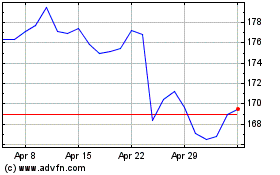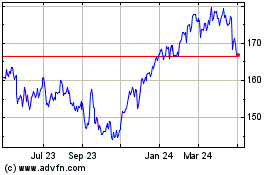Canada Warns of Freight-Rail Delays of 'Many Weeks'
February 26 2020 - 5:11PM
Dow Jones News
By Paul Vieira
OTTAWA -- Canada's Transport Minister said Wednesday the country
was "many, many weeks" away from a return to normal for
freight-rail traffic, after police this week dismantled a blockade
that had choked off shipments from east to west.
Marc Garneau told reporters in Ottawa the blockade, set up in an
indigenous community roughly 120 miles east of Toronto, has
"definitely slowed things down" and warned consequences may not be
realized for months. The blockade affected the main east-west
corridor operated by Canadian National Railway Co., the country's
largest railroad.
"The effect of these blockades are very serious," Mr. Garneau
said. "There is an inertia in the system. There have been companies
that have virtually stopped their operations. There are 50 ships on
the Pacific Coast waiting to pick up grain."
His comments came after the Ontario Provincial Police moved
Monday to dismantle a blockade led by indigenous anti-pipeline
protesters that lasted for more than two weeks, and threatens to
weigh markedly on growth in the first quarter.
The blockade was established in solidarity with some indigenous
leaders opposed to the construction of a natural-gas pipeline in
British Columbia, Canada's most-western province. Another blockade
remains in place near Montreal on indigenous territory, on track
owned by Canadian Pacific Railway.
Canadian Pacific said Wednesday it has obtained a court order in
Quebec to have the blockade removed. The blockade "has severed
vital rail connections and severely impacted CP's operations,
customers and the broader economy," a spokesman said.
Anti-pipeline protesters on Tuesday launched additional
temporary rail blockades across the country affecting, among
others, commuter-rail traffic serving suburban Toronto. The
blockades later dissipated.
Economists on Wednesday said the blockades' effects would
subtract from growth in the first quarter of 2020, citing data that
indicated a sharp 7.4% decline in Canadian freight-rail traffic in
February compared with the previous month. One economist, Derek
Holt of Bank of Nova Scotia, predicted the Bank of Canada would cut
its main interest rate next week because of the damage from the
rail blockades and the coronavirus epidemic.
On Wednesday, a video posted on Facebook by a media outlet
affiliated with protesters showed demonstrators on the tracks, one
carrying a gas can, and refusing to move as a Canadian National
Railway train approached. The protesters left the track with
seconds to spare before the train would have struck the
individuals, with at least one throwing debris. Police officers
stood on the other side of the tracks and watched.
Another video, broadcast by Canada's CTV News, showed a wooden
pallet burning next to the tracks as the train passed, with one
protester pouring gas on the tracks.
Mr. Garneau described what the protesters did Wednesday as "an
extremely reckless act." He added what transpired could have become
a dangerous situation had the train been carrying dangerous
goods.
Representatives for Canadian National -- which owns the track
subject to the blockade east of Toronto -- didn't respond to
questions about the dangers posed by protesters, or to comments
from Mr. Garneau about when rail-freight traffic returned to
normal.
Write to Paul Vieira at paul.vieira@wsj.com
(END) Dow Jones Newswires
February 26, 2020 16:56 ET (21:56 GMT)
Copyright (c) 2020 Dow Jones & Company, Inc.
Canadian National Railway (TSX:CNR)
Historical Stock Chart
From Mar 2024 to Apr 2024

Canadian National Railway (TSX:CNR)
Historical Stock Chart
From Apr 2023 to Apr 2024
